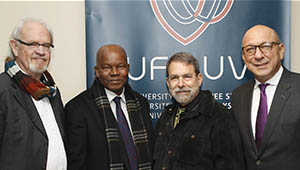Latest News Archive
Please select Category, Year, and then Month to display items
12 January 2024
|
Story Nonsindiswe Qwabe
|
Photo Sonia Small
 Since joining the UFS in 2008, Dr Grey Magaiza has worked extensively on approaches that can foster the socio-economic transformation of societies.
Since joining the UFS in 2008, Dr Grey Magaiza has worked extensively on approaches that can foster the socio-economic transformation of societies.
“The future should be one where communities can decide on their development agenda and futures. That’s the most important for me.” Dr Grey Magaiza, Deputy Director of the Centre for Gender and Africa Studies (CGAS) and Head of the Community Development programme on the Qwaqwa Campus, is passionate about capacitating communities to be agents of change and advancement. His vision for the future emphasises the empowerment of communities to take charge of their development by actively participating in decision making and the implementation of development projects that can improve their lives.
Since joining the UFS in 2008, Dr Magaiza has worked extensively on approaches that can foster the socio-economic transformation of societies. Over the years, he has crafted his research speciality into one that he is most proud of – being an interdisciplinary scientist immersed in the development of communities.
“I’m in a fortunate position of researching what I like. I say ‘fortunate’, because I’ve taken the time to understand what I’m passionate about, which is the overall field of rural livelihoods and livelihood futures – in short, community development. My research starts from an engaged university, understanding the elements that a university must use to enhance transformation and relevance to its immediate community in terms of development.”
One of the ways he has done this is by looking at social entrepreneurship as a development approach for young people in a rural setting. Through workshops with non-profit and civic organisations in Qwaqwa, Dr Magaiza has been helping these organisations to map out their needs and actively meet them through the involvement and support of external role players.
“We understand that communities are part of the national development agenda, but even that national agenda respects community knowledge and intentions and allows communities to shape their identity. A critical enabler of this is community organising. You bring back the capacity in communities to have dialogues on issues affecting them as spaces for engagement, knowledge exchange, and for people to just talk about their way forward.”
By enabling communities to define their development agenda, they can address their specific needs, challenges, and aspirations, he said. “When I look at livelihood futures, it’s quite an exciting aspect of my work – it’s like looking into a fortune tellers’ globe, because you’re not deciding for communities what they should do, but the communities themselves take those decisions.”
Trevor Manuel and Max du Preez among the recipients of honorary doctorates at UFS graduation
2016-07-02
 The UFS awarded four honorary doctorates
The UFS awarded four honorary doctorates
at its Winter Graduation ceremonies.
The recipients are from left Max du Preez,
Dr Reuel Jethro Khoza, Prof Joel Samoff
and Trevor Manuel at the UFS Chancellor’s
Dinner on 30 June 2016. Photo: Johan Roux
He is excited about the young minds he saw and interacted with at the graduation ceremony of the University of the Free State (UFS). This is what Max du Preez, one of South Africa’s leading journalists and political analysts, said after receiving an honorary doctorate.
According to Du Preez (Humanities), he was inspired by the Winter Graduation ceremony on 30 June 2016 in the Callie Human Centre on the Bloemfontein Campus. He is happy to finally also call the UFS his alma mater. He grew up in Kroonstad and is a true Free Stater, but previously graduated at the Stellenbosch University.
The UFS awarded four honorary doctorates – the others to Prof Joel Samoff (Humanities), Trevor Manuel and Dr Reuel Jethro Khoza (both Economic and Management Sciences) – and two Chancellor’s medals at the morning ceremony on 30 June 2016. Chancellor’s medals were awarded to Antony Osler and Marguerite van der Merwe (née Osler).
Manuel impressed by amount of soul
At the Chancellor’s Dinner, which was held in the Centenary Complex on the Bloemfontein Campus on 30 June 2016, Du Preez said he feels honoured. He said South Africans must embrace the diversity of the country, and the UFS is a good example. “If the University of the Free State can make it, South Africa can make it.”
Manuel, a former South African Finance Minister, said he is honoured by the amount of soul he experienced from Dr Khotso Mokhele, UFS Chancellor, and Prof Jonathan Jansen, Vice-Chancellor and Rector of the UFS. “We cannot tolerate what is wrong (in the country) and need to push the boundaries of what is right,” he said.
UFS stands out regarding understanding
Dr Khoza, a distinguished thinker and businessman, also thanked the UFS at the Chancellor’s Dinner. “We shall strive to be known less for what we say, but rather more for what we do,” he said about the country.
According to Prof Samoff, Professor in Africa Studies at Stanford University (USA), “South Africa has committed itself to building a democratic, non-racist, and non-sexist society”. “Where the University of the Free State stands out, is in its understanding that societal change – ‘transformation’, to use the current terminology – is not an outcome, but a process. A difficult process.”
Media Enquiries
Contact person: Lacea Loader (Director: Communication and Brand Management)
Tel: +27(0)51 401 3422/2707 or +27(0)83 645 2454
Email: news@ufs.ac.za | loaderl@ufs.ac.za
Fax: +27(0)51 444 6393